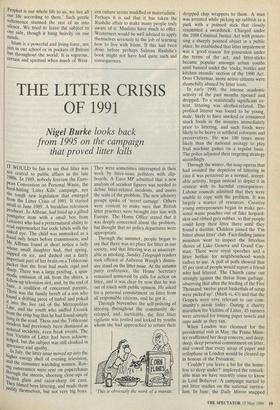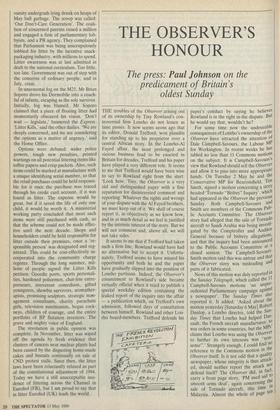THE LITTER CRISIS OF 1991
from 1995 on the campaign that proved litter kills
IT WOULD be fair to say that litter was not central to public affairs in the late 1980s. In 1989, nobody foresaw the Euro- kali Convention on Personal Waste, the hard-hitting 'Litter Kills' campaign, nor the tough new legislation that emerged from the Litter Crisis of 1991. It started small in June 1989. A breakfast television producer, Jo Allbran, had lined up a gifted Youngster item with a small boy from Leicester who had a preternatural ability to read supermarket bar code labels with the naked eye. The child was unmasked as a fraud only hours before transmission, and Ms Allbran found at short notice a lady Whose small daughter had, that spring, slipped on ice, and dashed out a fairly Important part of her brain on a Toblerone Packet that the frost had made rigid and sharp, There was a large postbag, a spas- modic emission of ink from the shires, a follow-up television slot, and, by the end of June, a coalition of concerned parents. There was the family bereft of a son who found a drifting piece of tinfoil and poked it. into the live rail of the Metropolitan ,LIne, and the youth who sniffed Evostik from the crisp bag that he had found simply !YIng in the road. These and the Toblerone incident had previously been dismissed as Isolated incidents, even freak events. The first Victims of Litter had been acknow- ledged, but the subject was still cloaked in Ignorance and apathy. , In July, the litter issue moved up into the hi In energy shell of evening television, and the consumer watchdog women. Rov- Mg cameramen were sent on paperchases broken the streets, shooting close-ups of broken glass and razor-sharp tin cans. They filmed boys littering, and made them Justify themselves, but not very big boys. They were sometimes interrupted in their work by litter-issue pollsters with clip- boards. A Euro MP admitted that a new analysis of accident figures was needed to define litter-related incidents, and assess the scale of the problem. The new advisory groups spoke of 'secret carnage'. Others were content to make sure that British litter practices were brought into line with Europe. The Home Office stated that it was deeply concerned about the problem, but thought that no policy departures were appropriate.
Through the summer, people began to say that there was no place for litter in our society, and that littering was as unaccept- able as smoking. Sunday Telegraph readers took offence at Auberon Waugh's dismis- sive stand on the litter issue. At the autumn party conference, the Home Secretary remained unmoved by calls for action on litter, and it was clear by now that he was out of touch with public opinion..He asked for a personal commitment on litter from all responsible citizens, and he got it.
Through November the self-policing of littering throughout the community de- veloped, and, inevitably, the first litter vigilante was jostled and kicked by youths whom she had approached to return their 'This is obviously the work of a maniac.' dropped chip wrappers to them. A man was arrested while picking up rubbish in a park with a pointed stick that closely resembled a swordstick. Charged under the 1988 Criminal Justice Act with posses- sing a sharply pointed object in a public place, he established that litter impalement was a 'good reason' for possession under the terms of the act, and litter-sticks became popular amongst urban youths until banned under the 'sticks, bottles and kitchen utensils' section of the 1990 Act. Over Christmas, more active citizens were shamefully abused by litter louts.
In early 1990, the intense academic activity of the past months ripened and dropped. To a statistically significant ex- tent, littering was alcohol-related. The profiled litterer was found to be young, male, likely to have smoked or consumed snack foods in the minutes immediately prior to littering, and such foods were likely to be heavy in artificial colorants and preservatives. He was 100 times more likely than the national average to play fruit machine games on a regular basis. The police adjusted their targeting strategy accordingly.
Through the winter, the soap operas that had avoided the depiction of littering in case it was perceived as a normal, accept- able activity, began instead to depict it in context with its harmful consequences. Labour councils admitted that they were unable to cope with the problem. It was largely a matter of resources. Creative young entrepreneurs began to make per- sonal waste pouches out of fake leopard- skin and ribbed grey rubber, so that people could keep their litter there until they found a dustbin. Children joined the 'I'm bitter about litter' club. Fact-finding junior ministers went to inspect the litterless shores of Lake Geneva and Grand Cay- man. There were royal speeches and a litter hotline for neighbourhood watch cadres to use. A poll of polls showed that 85 per cent of people would report a friend who had littered. The Church came out strongly against the threat from garbage, observing that after the feeding of the Five Thousand 'twelve great basketfuls of scrap were picked up'. (Mark vi, 43) and that the Gospels were very relevant to our com- munity's needs today. During a charity marathon for Victims of Litter, 45 runners were arrested for tossing paper towels and cups aside as they ran.
When London was cleansed for the presidential visit in May, the Prime Minis- ter reaffirmed her deep concern, and deep, deep, deep personal commitment on litter, and vowed that every scrap of paper and cellophane in London would be cleared up in honour of the President.
'Couldn't you leave a bit for the home- less to sleep under?' implored the remark- able man we have recently come to know as Lord Bolsover. A campaign started to put litter studies on the national curricu- lum. In June, the Daily Mirror snapped varsity undergrads lying drunk on heaps of May ball garbage. The scoop was called: `Our Don't-Care Generation'. The coali- tion of concerned parents raised a million and engaged a firm of parliamentary lob- byists, and a PR agency. They complained that Parliament was being unscrupulously lobbied for litter by the lucrative snack- packaging industry, with millions to spend. Litter awareness was at last admitted in draft to the national curriculum. Too little, too late. Government was out of step with the concerns of ordinary people, and in July, crisis.
In unseasonal fog on the M25, Mr Brian Soporo drove his Dormobile into a coach- ful of infants, escaping as the sole survivor. Initially, fog was blamed. Mr Soporo claimed that a piece of floating litter had momentarily obscured his vision. 'Don't wait — legislate,' bannered the Express. 'Litter Kills,' said the other dailies. 'We are deeply concerned, and we are considering the options as a matter of urgency,' said the Home Office.
Options were debated: wider police powers, tough new penalties, printed warnings on all potential littering items like toffee papers and crisp packets. Also, such items could be marked at manufacture with a unique identifying serial number, so that the retail purchaser could be held responsi- ble for it once the purchase was traced through his credit card account, if it was found as litter. The expense would be great, but if it saved the life of only one child, it would be worth it. A ministerial working party concluded that most such items were still purchased with cash, so that the scheme could not be made effec- tive until the next decade. Shops and householders could be held responsible for litter outside their premises, once a 're- sponsible person' was designated and reg- istered. This could be cost-effectively in- corporated into the community charge register. Through the long summer, mil- lions of people signed the Litter Kills petition: Geordie poets, sports personali- ties, hardened policemen, chat-line entre- preneurs, irreverent comedians, gifted youngsters, showbiz survivors, aromather- apists, promising sculptors, strategic man- agement consultants, charity parachute girls, television nutritionists, bogus cock- neys, children of courage, and the entire portfolio of BP flotation investors. The grave and mighty voice of England.
The revolution in public opinion was complete. In November, litter was wiped off the agenda by fresh evidence that clusters of cancers near nuclear plants had been caused by the disgusting home-made cakes and biscuits continually on sale at CND protest stalls. Since then, the litter laws have been reluctantly relaxed as part of the constitutional adjustment of 1994. Today we have a still unacceptable inci- dence of littering across the Channel in Eurofed (FR), but I am proud to say that in litter Eurofed (UK) leads the world.



























































 Previous page
Previous page